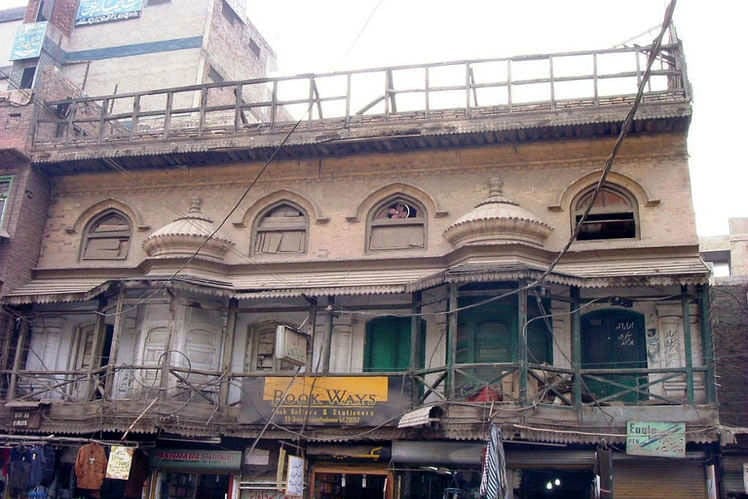
What is the government doing about the houses in Peshawar where some of Indian cinema’s greatest heroes were born

The news of the Kapoors’ property in Peshawar is in circulation again. From time to time such news is flashed across the media and some song and dance enacted about heritage being preserved, and then it is all consigned to the dustbin of projects that never took off.
During the reign of the Awami National Party there was much talk about the houses of Dilip Kumar and of Prithviraj Kapoor being turned into heritage site or house museums in memory of the great contribution that these individuals made to the promotion of the arts, in this case the cinema. But then nothing substantial was ever achieved. It did not move beyond good intention making people wonder whether it was ever meant to go beyond just words and empty gestures.
As a matter of fact, Peshawar or residents of Khyber Pakhtunkhawa should be immensely proud of the achievements of its sons and daughters. Then in faraway Bombay, the city of dreams of the youth, these young men not only made breakthroughs but went on to dominate the film world, initially in the subcontinent and then across the globe as the outreach of this cinema increased.
People in Russia knew Raj Kapoor more than they knew their own leaders and film stars and the common man in India was more familiar with Dilip Kumar than with the ministers of the Congress Party. As these men lived the dreams of the people of the subcontinent, they found a comfortable niche within the hearts of many.
Will the fate of this announcement be any different from the previous ones or will it be treated just as non-seriously? In the previous attempts, it appeared that those occupying these properties or the owners sensed it to be a lottery-like bonanza and jacked up the values accordingly, which the government found too steep to scale. But then governments should not always worry about the cost and benefit ratios and some things that need to be done should be done. After the announcement, it was all the more regrettable that the initiative was stalled only because of the money involved in it.
It is usually assumed that social orders that are more open and informal institutions for the nourishment of arts are more likely to throw up talent. But there may be other examples, like that of the current Khyber Pathtunkhwa, where conservatism has reigned as long as one can remember. Such expressions have been a violation of the norm rather than a natural outcome of a talent flowering with societal consent. Arts then, as many have stressed, can only be conceived in defiance and flourish in adversity; the unhospitable environs of the Pakhtuns have been the unwitting cause of such blooming of talent.
The land of the Pakhtuns has taken hits time and again. With the Taliban in power in Afghanistan, the artistes flocked to Peshawar and it became a centre of Pakhtun music in production and performance. But when they were deposed and a new government under Karzai took over, they considered going back. The decision was hastened for them when the Mutahidda Majlis e Amal’s government actively discouraged cultural activity at the beginning of this century. The consequence being that Kabul became a centre of such activity and many from Pakistan migrated to that city. There has been a constant migratory flow, both ways, across the Durand Line that shares the same culture. Many of the most outstanding musicians, tired of the uncertain security environment and constant toing and froing, have sought a third home in the European or American cities and operate from there both for the diaspora and the growing international market for musical expression that encourages eclecticism.
A hundred year ago, a house in Dhakki Munawwar Shah was built by Dewan Basheshwarnath Kapoor, father of Prithviraj Kapoor, grandfather of Raj Kapoor, Shammi Kapoor, Shashi Kapoor great grandfather of Rishi and Randhir Kapoor and great great grandfather of Karishma, Kareena and Ranbir Kapoor. Most agree that it should be preserved as a humble payback to the happiness and pleasure that these stars and show business personalities have filled people’s lives with.
Dilip Kumar’s family moved away from Peshawar to Bombay in search of greener pastures as their fruit business was not doing well. Dilip Kumar, born in Peshawar, grew up in Bombay. In defiance and without the knowledge of his family, he joined the films and became, after a few setbacks, their leading actor. He did not have a chance to come back to the city of his birth almost for fifty years till the nineteen eighties. He went to see the house off Kissa Khawani Bazaar where he was born. When back in Bombay, he heard that another son of Peshawar, Raj Kapoor was seriously ill and in hospital. He drove straight from the airport to the hospital, sat there for a while holding the hand of Raj Kapoor, whispering in the ear of a dying Raj Kapoor that he had been to Peshawar, communicating to him the feel of the city and the experience that he had been through.
The family of Shahrukh Khan, another superstar of the cineworld also belongs to Peshawar. His father moved away probably to Delhi just before partition, in search of greener pastures and then did not come back to the land of his birth, married and had a son who was to shine across the firmament of cinema. The extended family, uncles, aunts and cousins of Shahrukh Khan still live in the city of Peshawar.
After partition, the remaining part of the Prithviraj Kapoor family left the house and the city of Peshawar. Shashi, Randhir and Rishi Kapoor visited the house once and carried a handful of soil from its compound with them to Bombay.